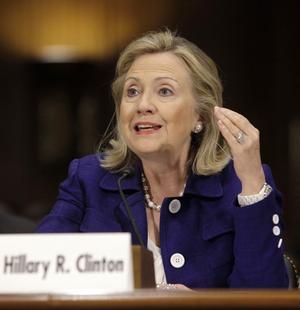Indonesia: Clinton Should Raise Human Rights Concerns Address Military Impunity, Freedom of Religion and Expression July 19, 2011 |

US Secretary of State Hillary Clinton
© 2011 Reuters
© 2011 Reuters
|
(New York) — US Secretary of State Hillary Clinton should raise military accountability for abuses, freedom of expression, and the rights of religious minorities during her visit to Indonesia on July 21 to 24, 2011, Human Rights Watch said in a letter to Secretary Clinton released today.
Clinton is to arrive in Bali a year after Robert Gates, the US defense secretary at that time, formally announced the resumption of US military relations with Indonesia’s special forces, Kopassus, which removed the last significant barrier to full-fledged US-Indonesian military ties.
“Closer US military ties with Indonesia were a reward for better behavior by Indonesian soldiers, yet one year later atrocities by the military still go unpunished,” said Elaine Pearson, deputy Asia director at Human Rights Watch. “This is an important opportunity for Clinton to speak publicly about the need for genuine military reform.”
On July 22, 2010, Secretary Gates announced that the Indonesian Defense Ministry “publicly pledged to protect human rights and advance human rights accountability and committed to suspend from active duty military officials credibly accused of human rights abuses, remove from military service any member convicted of such abuses, and cooperate with the prosecution of any members of the military who have violated human rights.”
However, the Indonesian military has failed to live up to its pledges to the US government to improve accountability, Human Rights Watch said. In one example, in January, three soldiers received light 8-to-10 month sentences for “disobeying orders” in the May 2010 torture of two farmers in Papua. None were charged with torture despite video evidence showing the soldiers kicking the victims, threatening one with a knife to his face, and repeatedly jabbing the second in the genitals with burning wood. Yet, a US Defense Department official characterized the prosecution of this case as “a success.”
Human Rights Watch also urged Clinton to raise concerns about several laws that criminalize the peaceful expression of political, religious, and other views. Clinton should call on President Susilo Bambang Yudhoyono to release immediately the more than 100 activists currently behind bars in Indonesia for peaceful acts of free expression, Human Rights Watch said.
Longstanding impunity for violence against religious minorities in Indonesia has fostered larger and more brutal attacks by Islamist militants. Since President Yudhoyono issued a decree restricting activity by the Ahmadiyah religious community in 2008, more than 180 attacks against Ahmadiyah mosques and other properties have been recorded. The Ahmadiyah, who consider themselves Muslims, have long been the targets of violence and persecution in Indonesia because some Muslims view them as heretics. Clinton should urge Yudhoyono to withdraw the 2008 anti-Ahmadiyah decree and take other actions to protect religious freedom in the country, Human Rights Watch said.
“Laws stifling dissent are used against peaceful critics, and violent attacks on religious minorities are getting worse,” Pearson said. “If the US really wants to support Indonesia as a rights-respecting democracy, then Clinton should not shy away from stressing the importance of rolling back practices that undermine freedom of religion and speech.”
Clinton is to arrive in Bali a year after Robert Gates, the US defense secretary at that time, formally announced the resumption of US military relations with Indonesia’s special forces, Kopassus, which removed the last significant barrier to full-fledged US-Indonesian military ties.
“Closer US military ties with Indonesia were a reward for better behavior by Indonesian soldiers, yet one year later atrocities by the military still go unpunished,” said Elaine Pearson, deputy Asia director at Human Rights Watch. “This is an important opportunity for Clinton to speak publicly about the need for genuine military reform.”
On July 22, 2010, Secretary Gates announced that the Indonesian Defense Ministry “publicly pledged to protect human rights and advance human rights accountability and committed to suspend from active duty military officials credibly accused of human rights abuses, remove from military service any member convicted of such abuses, and cooperate with the prosecution of any members of the military who have violated human rights.”
However, the Indonesian military has failed to live up to its pledges to the US government to improve accountability, Human Rights Watch said. In one example, in January, three soldiers received light 8-to-10 month sentences for “disobeying orders” in the May 2010 torture of two farmers in Papua. None were charged with torture despite video evidence showing the soldiers kicking the victims, threatening one with a knife to his face, and repeatedly jabbing the second in the genitals with burning wood. Yet, a US Defense Department official characterized the prosecution of this case as “a success.”
Human Rights Watch also urged Clinton to raise concerns about several laws that criminalize the peaceful expression of political, religious, and other views. Clinton should call on President Susilo Bambang Yudhoyono to release immediately the more than 100 activists currently behind bars in Indonesia for peaceful acts of free expression, Human Rights Watch said.
Longstanding impunity for violence against religious minorities in Indonesia has fostered larger and more brutal attacks by Islamist militants. Since President Yudhoyono issued a decree restricting activity by the Ahmadiyah religious community in 2008, more than 180 attacks against Ahmadiyah mosques and other properties have been recorded. The Ahmadiyah, who consider themselves Muslims, have long been the targets of violence and persecution in Indonesia because some Muslims view them as heretics. Clinton should urge Yudhoyono to withdraw the 2008 anti-Ahmadiyah decree and take other actions to protect religious freedom in the country, Human Rights Watch said.
“Laws stifling dissent are used against peaceful critics, and violent attacks on religious minorities are getting worse,” Pearson said. “If the US really wants to support Indonesia as a rights-respecting democracy, then Clinton should not shy away from stressing the importance of rolling back practices that undermine freedom of religion and speech.”





